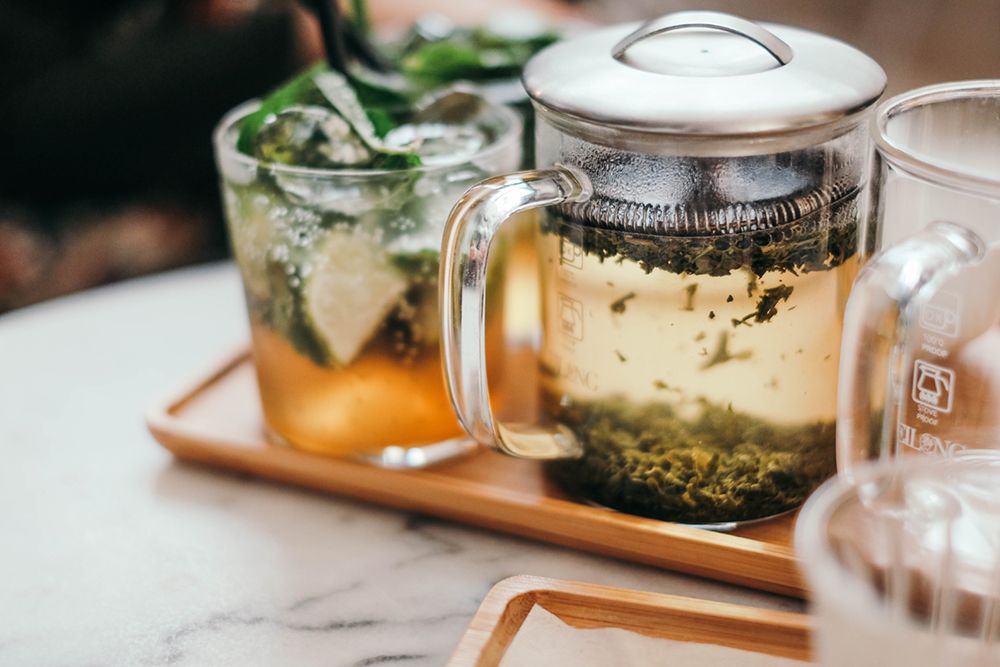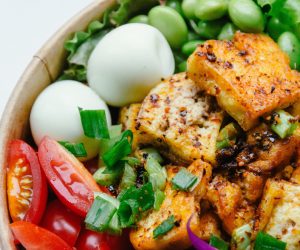
Jasmine Tea Benefits for Skin, Brain & Heart Health (Plus How to Make It)
Jillian Levy, CHHC via Dr. Axe – Records show that starting in the late 1300s during the China’s Ming dynasty, jasmine tea became one of the most popular teas in Asia. It was also one of the first flavored teas to be exported out of China to the West and today still remains a very sought-after tea worldwide.
Is it as healthy as other teas? Not only does it have a soothing aroma and soft, floral taste, but benefits of jasmine tea include its ability to fight inflammation, protect cells from oxidative stress and support a healthy metabolism.
What Is Jasmine Tea?
What is jasmine tea made out of? It’s typically a type of green tea that’s made with the addition of steeped jasmine flowers.
Jasmine plants are members of the olive family, also called the Oleaceaeplant family. The flowers used to make this type of are usually derived from two related plant species: “Common Jasmine” (Jasminum officinale) or “Sampaguita “(Jasminum sambac). These plants are native to the Middle East, including Iran, Afghanistan and Pakistan.
Jasmine is considered to be a health-promoting, anti-inflammatory teabecause it contains antioxidants, including polyphenols. Polyphenols like EGCG have been shown to have free radical-scavenging abilities and other beneficial effects that help protect cells and tissues throughout the body.
What is the taste of jasmine tea?
It’s described as having a soothing, light, floral and clean but somewhat perfumed taste. Other traits used to describe the overall flavor profile include:
- sweet
- fresh
- blossomed
- dewy
- bouquet
- delicate
- subtle
Green tea itself can sometimes be bitter depending on how it’s made, so jasmine tea might have a bit of bitterness, too. However, jasmine flowers themselves are said to have a naturally relaxing and soft scent, which some researchers suggests can help to support a positive mood and provide stress relief.
Types/Varieties
The most commonly produced type of jasmine tea is the kind made with green tea. In some cases it may also be made by steeping jasmine flowers in white, oolong or black tea.
Depending on the specific type of tea, it might be mixed with other flavors or scented ingredients, such as:
- lavender or chamomile flowers
- fruit
- spices
- oils
- extracts
- natural or artificial flavors
Jasmine tea varieties differ from one another based on the exact type of leaves and flowers used in the tea, plus how they are steeped and for how long. Various amounts and types of green tea leaves many be used, which have different “grades” depending on the species and how they are harvested and processed.
When it comes time to steep the flowers to make this tea, two different methods are primarily utilized: the layering method and the mixing method. The traditional layering method uses fresh jasmine flowers that are slowly dried on top of green tea leaves to improve the aroma and flavor by infusing the green tea before the tea is dried and packaged. The other method uses wilted flowers mixed in with green tea leaves.
Additionally, some manufacturers don’t use jasmine flowers but instead use jasmine essential oil, which is made by extracting the oils from jasmine plants. This essential oil is extremely expensive and rich in phytonutrients.
To cut costs, today some tea makers also use “jasmine natural flavor” or artificial jasmine flavor mixed with other teas, but this doesn’t have the same benefits as using actual flowers or essential oil.
Benefits/Uses
1. High in Antioxidants
One of the most well-researched jasmine tea benefits if its supply of antioxidants, especially polyphenols and catechins, such as EGCG (which stands for epigallocatechin-3-gallate).
These protective compounds are most abundantly present when the tea is made with good-quality green tea (from the Camellia sinensis plant).
Antioxidants such as catechins and EGCG are know to promote a healthy inflammation response, support normal cholesterol levels, and help protect the skin, heart and brain from free radical damage. They may also have the ability to fight caner by reducing tumor cell growth, decreasing tumor size and suppressing the spread of cancer cells.
Some specific flavanols and antioxidants found in jasmine green tea include:
- EGCG
- epicatechin
- epigallocatechin
- gallocatechin
- other gallate derivatives
- several sesquiterpenoids, which have anti-inflammatory effects and help promote healthy circulation
EGCG is associated with additional anti-aging health perks, such as enhanced metabolic activities that may prevent weight gain, and a boost in thermogenesis (the body producing heat by using energy). It may also help manage your appetite and support healthy blood sugar levels.
2. Can Lift Energy and Focus
In addition to polyphenols, jasmine tea and green tea contain the amino acid l-theanine, which has positive effects on cognitive health, including the ability to increase alertness without causing “jitters” like some stimulants can.
This tea also contains small amounts of caffeine, which can improve concentration and motivation.
In Traditional Chinese Medicine, jasmine tea is said to increase yang qualities, meaning it has warm, dry and bright qualities that make it uplifting. It’s recommended for people with “low yang,” such as those who live in cold climates, have lethargy or low energy, or who work too much or feel overly depleted.
3. Has a Relaxing Scent and Taste
Jasmine tea is unique in that it has both stimulating and calming effects. The flower petals are thought to have a floral, calming aroma in part due to the presence of the compound called linalool.
Studies suggest that smelling linalool can help promote activity of your parasympathetic nervous system, which is the part of your nervous system that helps you relax. Since it assists your body and mind in unwinding, this tea can potentially aid in lowering your heart rate and reducing muscle tension.
It may even increase release of the “feel good” chemical called GABA, which has mood-boosting effects.
L-theanine found within this tea also helps support a healthier response to stress, leading to improved relaxation and potentially benefits like better sleep.
How to Make It
Can I drink jasmine tea every day?
Yes — considering jasmine tea benefits many different parts of your body, including your heart and brain, it’s an ideal type of tea to enjoy daily. This is assuming you don’t respond poorly to low amounts of caffeine intake.
Which type should I buy?
When purchasing jasmine tea you’ll have the option of either buying loose-leaf teas or bagged tea bags.
According to the Teatulia website, “There are at least seven provinces in China that produce jasmine tea, but the most famous and most traditionally scented jasmine tea comes out of the Fujian region.” Look for teas made in the region if you’re looking for top quality.
How should the tea be stored?
Green teas are typically best consumed within six months to a year of purchase. To keep teas fresh, store them in a cool, dark place that is dry, away from light, oxygen and moisture.
How do I make it?
- To preserve the delicate antioxidants in green tea and jasmine petals, use very hot water but not boiling water. Ideally aim to use water that is around 160 to 190 degrees Fahrenheit. (It should be simmering, not boiling.) You can get the right temperature by allowing boiling water to rest a minute before pouring it over the tea leaves.
- Add about one teaspoon of loose-leaf jasmine tea for every one cup of water. If using “jasmine pearls,” use about 2–3 pearls per cup of water.
- Jasmine green tea should steep anywhere from 30 seconds to 5 minutes depending on how the tea was processed. Most experts recommend steeping for about 3 minutes on average.
- The finished product should usually have a pale golden-yellow color with floral notes and a fresh finish.
When making this tea, you might find that finished product has a bit of an astringent taste. If this occurs, you can improve the taste by lowering how long you steep the tea, lowering the steeping temperature and purchasing high-quality jasmine tea leaves or flowers.
Caffeine Content
Is jasmine tea high in caffeine? Considering it’s a type of green tea, it has the same caffeine content as other green teas.
The addition of jasmine flowers does not add more caffeine.
How much caffeine is in green tea/jasmine tea? It has 28 milligrams of caffeine per cup, which is less than coffee (95 mg per cup) and black tea (47 mg per cup).
The amount of caffeine per cup varies depending on the exact type of tea as well as how is was processed and prepared.
The caffeine in jasmine tea makes it different than most “herbal teas,” such as peppermint, ginger or chamomile teas, which are typically caffeine-free.
To reap the most benefits of jasmine tea without experiencing side effects, stick to about two to three cups per day.
Risks and Side Effects
While it’s generally safe to consume, people sensitive to caffeine should be careful of their tea intake. Pregnant and breast-feeding women should drink no more than one or two cups per day, as some research shows that more caffeine than this amount may interfere with normal heart rhythms.
Consuming caffeinated teas on on an empty stomach may also cause an upset stomach in some people. If this occurs, try having it with a meal.
Conclusion
- Jasmine tea is a type of flower-scented tea that is most often made by steeping jasmine flowers in green tea.
- Benefits of jasmine tea are similar to those of green tea, such as providing polyphenols and other antioxidants.
- These compounds, such as flavanols and sesquiterpenoids, have many anti-aging effects and can help protect the heart, skin and brain.
- Jasmine tea is both uplifting and calming. It can help increase alertness (it contains small amounts of caffeine and the compound EGCG) but can also help the body cope with stress.
- Enjoy two to three cups per day for the most benefits. You can make it at home with loose tea leaves or flowers, or use dried jasmine pearls or tea bags.
To read the original article click here.






